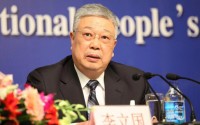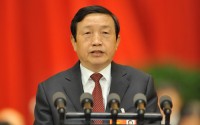Interview with Alice Lau (3) Belief in Civil Engagement
For those who are not familiar with Alice Lau, she is a well-respected leader in Chinese philanthropy. She led a delegation of leaders in business and nonprofits on a study tour to Boston in December 2013. I had the privilege of working with the group and interviewing Alice Lau. I’m writing up the interview in 3 parts. This is part 3: Belief in Civil Engagement. You may continue reading: Part 1: Finding Mission and Part 2: A Journey of Continuous Learning
Alice Lau’s Vision on Philanthropy from Global Philanthropy Common on Vimeo.
H: From your experiences with business people at SEE and Lions Club, what do you think have motivated them in their charity work?
A: Members at SEE and Lions Club are pretty different. SEE was founded by a group of most influential entrepreneurs in China, such as Liu XiaoGuang, Liu ChuanZhi, Ren ZhiQiang, Wang Shi etc.. Most of them were born in the 1950s and 1960s, who often consider themselves as idealists, driven by a strong sense of social mission. Subsequent members, such as myself, have been attracted either by the mission of the organization or the influence of the heavy weights. The uniqueness about SEE is that 99% of the members are from private business. We have around 300 members now. Only a few are from State Owned Enterprises. These entrepreneurs know from first-hand experiences how difficult it is to breakthrough in a state regime, thus have a strong desire to support grassroots civil organizations. It’s in their genes.
On the other hand, Lions Club members are mostly small business owners and white-collar professionals. Most of them might not be motivated by social mission. Instead, they are often driven by the good will to help people in need.
Both organizations are crucial to developing civil society in China. SEE can play a significant leading role, as pursuing social equity and social changes are indeed their goals. If we could double the number of our members, say 500, even 1000, and help them learn and grow in fulfilling their social missions, they will be able to have a significant impact not only in the business world, but also on the whole society.
Lions Club is more geared toward average citizens. It offers people the opportunity to participant in various social service, and experience the joy of helping others. On this platform, they may grow their awareness of social responsibility, as well as their capacity, and may eventually assume a larger role in charity. I myself is an example. Lions Club got my foot into the door of charity, and had a great influence on my decision to fully switch into the nonprofit sector. I feel extremely lucky to be serving these two organizations.
H: Let’s shift gears. Outside China, people following Chinese philanthropy are often acquainted with incidents such as the visit of Gates and Buffet to China, Guo MeiMei and China Red Cross Society, and Chen GuangBiao’s high-profile philanthropy. What do you think? Why did some rich people shy from the banquet invitation from Mr.Gates and Mr.Buffet?
A: I personally admire Mr.Gates and Mr.Buffet’s efforts on the Giving Pledge and share their view on wealth. We are just wealth keepers. In the end, the wealth should still go back to the society. However, it takes time to cultivate this sort of thinking in China. It has been only 30 years since Chinese were allowed to create private wealth, and it may sound a little bit scary for the first generation wealthy people to give all their money away. I believe philanthropy has to come from the heart, not out of regulation or outside pressure. In fact, in China, there are already people like Gates and Buffet, one being Cao DeWang. He has already donated his stock equity worth over 600 million dollars. Recently I’m in contact with another person, who has planned to give over one billion dollars in the next 3-5 years. Again, Mr. Gates and Mr. Buffet have set up good examples for the wealthy in China, and I believe their efforts will not go in vain. We should plant seeds with patience. Given time, it will flourish.
H: Then how about the Guo MeiMei scandal? Has this incident really sabotaged the public credibility of charity in China?
A: I should say the Guo MeiMei incident is just ridiculous, and it can only happen in government-supported foundations, to quote Feng Lun, the chairman of SEE, “In our organization, the money for charity comes from our own pocket. Why would anyone fool around with our own money?” Many privately-funded organizations, like SEE, have a very high standard on accountability and transparency, and there is hardly room for corruption. So I don’t think the Guo MeiMei scandal can overthrow the whole sector, but it may indeed shake some government-supported organizations.
H: So the Guo MeiMei incident is not all negative…
A: Exactly. If we think a step further, this incident may accelerate the change of those organizations. They have to change. During the recent earthquake in Ya’An, China Red Cross Society has totally lost to One Foundation in public fundraising. One Foundation is non-government affiliated. I think incidents like Guo MeiMei scandal will actually channel more resources to grassroots organizations with higher accountability and effectiveness, thus help bring charity back to the civil society.
H: What do you think about the high-profile donation of Chen GuangBiao?
A: I used to think he truly enjoyed philanthropic work, but I’ve increasingly realized he is actually consuming philanthropy, which is totally unacceptable to me.
H: Let’s change lenses again. When people talk about the gap between Chinese philanthropy and American philanthropy, they often attribute it to the difference in political system. What do you think?
A: The major problem with current political system is lacking efficient regulations, which don’t provide much room for the growth of civil organizations. So the pace to advance won’t be as fast as that in a democratic society. But we should never overlook civil power. It will grow, with or without favorable policies, and can eventually impact the policy in turn. Meanwhile, positive changes in regulation have already happened, such as lifting control on registration for social organizations. This is an inevitable trend, especially after civil organizations have grown stronger. So I think the difference in political systems certainly has a great influence on the sector, but things will change. We just need a little more patience and resilience.
H: You are confident.
A: Sure. It has only been 10 years since I started charity work, and I have personally witnessed the huge improvement in the sector. The last past 10 years is a period Chinese philanthropy has developed the fastest. It’ll be even faster in the future.
H: Talking about future, how do you think Chinese philanthropy can fit into global philanthropy?
A: Well, Chinese philanthropy is still at an infancy stage. But just like Chinese economy, we can leverage the second-mover advantage by learning from global philanthropy. The development of China Lions Clubs is a perfect example. In the past 10 years, membership at China Lions Club has grown from zero to over 20,000. Why? It has benefited from the experiences from Lions Club International. Most challenges we encounter today in China have already been addressed in the system of Lions Club International, from organizational structure to operational policies. We didn’t have to explore from the scratch on our own. SEE is another example. In 2008, when SEE was planning on establishing a private foundation, but had no idea on how to run such a foundation. So they sent a delegation to the States, and then adapted the learning to their own operation. That’s why I really appreciate the opportunity to lead this delegation to the States, to experience, and to learn.
H: So you were talking about two models of learning. China Lion Club is transplanting a mature system to China.
A: Right, SEE is venturing out, seeking what might be useful, and then adapt. The key is openness, whether it’s in the mentality, in the organization or in the society. With the openness, I am optimistic that Chinese philanthropy will achieve substantial development. I am positive.



